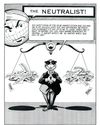Try GOLD - Free
Toward A Unified Theory Of Stalin, The Teamsters, Alcoholics Anonymous, And Facebook
Reason magazine
|June 2018
Toward A Unified Theory Of Stalin, The Teamsters, Alcoholics Anonymous, And Facebook

THE IMPOSING TORRE del Mangia is a 289-foot tower rising over Siena’s city hall. Below, the Piazza del Campo serves as the Tuscan town’s market square, civic meeting place, and entertainment venue. Together they form the metaphor in the title of The Square and the Tower, the British historian Niall Ferguson’s new book about networks, hierarchies, and how they have interacted throughout history.
How hierarchies operate is not a conceptual mystery. The emperors of Rome, the caliphs of Islam, the autocrats of the Kremlin, the armies of Napoleon and Eisenhower, the corporate managers of General Motors, the bosses of the Teamsters Union: In each case we see a Mr. Big at the top of the tower directing lieutenants, satraps, prefects, and legates, all the way down to the grunts at the bottom. Hierarchies arose at the beginning of human civilization, but the “zenith of hierarchically organized power,” Ferguson writes, “was in fact the mid– 20th century—the era of totalitarian regimes and total war.”
Yet hierarchies do not rule perpetually without challenge. Ferguson argues that since 1446, three disruptive changes have made it increasingly easy for large numbers of people to interact and collaborate over time and space—that is, to network. The first was the printing press, whose output swept across 15th century Europe and then beyond. The next was the 19th century telegraph cable, which allowed messages to flow from London to Bombay in four minutes. (The telephone, the fiber optic cable, and the satellite download dramatically accelerated this revolution.) The third change is the instantaneous communication of the internet.
This story is from the June 2018 edition of Reason magazine.
Subscribe to Magzter GOLD to access thousands of curated premium stories, and 10,000+ magazines and newspapers.
Already a subscriber? Sign In
MORE STORIES FROM Reason magazine

Reason magazine
A Nostalgic Read for Foreign Policy Elites
IF YOU WERE looking for a human avatar of America's unipolar moment, you couldn't do better than Michael McFaul. Picture a youthful, energetic McFaul with a newly minted Ph.D. bounding into the suddenly post-Soviet space of the early 1990s, full of bright ideas about democracy and faith in the end of history. As McFaul himself puts it, 1991 \"was a glorious moment to be a democratic, liberal, capitalist, multilateralist, and American....I was treated like a rockstar.\"
4 mins
January 2026

Reason magazine
TRUMP IS DEPORTING ENTREPRENEURS
THE TRUMP ADMINISTRATION'S MASS DEPORTATION EFFORT IS ROBBING THE U.S. OF IMMIGRANT BUSINESS OWNERS AND THEIR CONTRIBUTIONS.
9 mins
January 2026
Reason magazine
The First Information Revolution
PRINTING PRESSES AND LIBRARIANS INTERPRETED CENSORSHIP AS DAMAGE AND ROUTED AROUND IT.
11 mins
January 2026

Reason magazine
What Would Bill Buckley Do?
THE NATIONAL REVIEW FOUNDER'S FLEXIBLE APPROACH TO POLITICS DEFINED CONSERVATISM AS WE KNOW IT.
7 mins
January 2026

Reason magazine
MAHA Mandates Food Labels
BURDENSOME FOOD LABELING mandates were once the province of Democrats, who pushed for calorie count requirements on restaurant menus and insisted packaged food must feature warnings about genet- ically modified ingredients and trans fats. Now it's Republicans leading the charge- with equally foolish results.
2 mins
January 2026

Reason magazine
IS JAKE TAPPER DOOMED?
THE CNN ANCHOR ON THE WAR ON TERROR, THREATS TO FREE SPEECH, AND THE FUTURE OF MEDIA
14 mins
January 2026

Reason magazine
REPUBLICAN SOCIALISM
THE TRUMP ADMINISTRATION IS BUYING STAKES IN COMPANIES. THAT NEVER ENDS WELL.
13 mins
January 2026

Reason magazine
A Taste of Capitalism in Warsaw
WARSAW, POLAND, IS a living museum of economic systems. It's a city where concrete reliefs of stoic factory workers decorate a building that now houses a Kentucky Fried Chicken, where a Soviet-era apartment block stands beside a glass tower filled with coworking spaces.
2 mins
January 2026

Reason magazine
Robert Crumb's Roving Art and Life
IN THE SPRING of 1962, an 18-year-old Robert Crumb was beaned in the forehead by a solid glass ashtray. His mother, Bea, had hurled it at his father, Chuck, who ducked. Robert was bloodied and dazed, once again a silent and enraged witness to his family's chaos.”
5 mins
January 2026

Reason magazine
THE HOWARD ROARK OF COMICS
SPIDER-MAN CO-CREATOR STEVE DITKO WAS A GREAT EXAMPLE OF, AND DIRE WARNING TO, OBJECTIVIST POP ARTISTS.
12 mins
January 2026
Translate
Change font size

